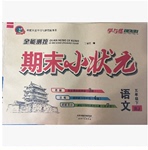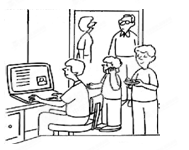题目内容
"Who did this?" Mrs. Green asked with a piece of broken glass in her hand. She had never been so 51 with us. The classroom was so quiet. All students looked at the window except me. I kept my head 52 . I knew it was me. I broke it when I practiced 53 baseball. But should I tell the truth? If I did, I would be in trouble, I didn’t have enough 54 . How could I afford to buy such an expensive window? I really didn’t want to put up my hand, 55 at last I said. “I did it. I am sorry.” It was not 56 for me to say those words.
Mrs. Green went to the book shelf and took down a book. Then she walked to me. Looking at 57 , I was a little afraid. To my surprise, she said, "I know you like 58 .Here is the book about them. It’s yours now. I give it to you not because you broke the window, but because you are 59 ." I couldn’t believe it. I wasn’t punished(惩罚). However, I was given my favorite book about birds.
It happened 20 years ago, but I still 60 the book. The lesson my teacher taught me that day will be in my heart forever.
Mrs. Green went to the book shelf and took down a book. Then she walked to me. Looking at 57 , I was a little afraid. To my surprise, she said, "I know you like 58 .Here is the book about them. It’s yours now. I give it to you not because you broke the window, but because you are 59 ." I couldn’t believe it. I wasn’t punished(惩罚). However, I was given my favorite book about birds.
It happened 20 years ago, but I still 60 the book. The lesson my teacher taught me that day will be in my heart forever.
| 小题1: |
|
| 小题2: |
|
| 小题3: |
|
| 小题4: |
|
| 小题5: |
|
| 小题6: |
|
| 小题7: |
|
| 小题8: |
|
| 小题9: |
|
| 小题10: |
|
小题1:B
小题1:B
小题1:C
小题1:D
小题1:B
小题1:A
小题1:B
小题1:C
小题1:D
小题1:A
小题1:B根据语境“老师手中拿着破碎的玻璃”可知老师“生气”了
小题1:B做错了事情所以“头”低着
小题1:C考查词语搭配practice后接动名词
小题1:D根据下句How could I afford to buy such an expensive window?可知我没有足够的钱
小题1:B前后语境为转折关系故用but。我不想举手承认但是我最终说出了实情
小题1:A根据上文可知我说出实情是一件不容易的事
小题1:B Looking at后接宾格形式作宾语
小题1:C根据本段最后一句I was given my favorite book about birds.可知“我喜欢鸟”
小题1:D因为我承认错误所以我是诚实的
小题1:A词义辨析keep“保存”, give 给, borrow 借, lose 丢。 根据语境“这件事发生在20年前但是我仍然保存着这本书”可知答案为A
小题1:B做错了事情所以“头”低着
小题1:C考查词语搭配practice后接动名词
小题1:D根据下句How could I afford to buy such an expensive window?可知我没有足够的钱
小题1:B前后语境为转折关系故用but。我不想举手承认但是我最终说出了实情
小题1:A根据上文可知我说出实情是一件不容易的事
小题1:B Looking at后接宾格形式作宾语
小题1:C根据本段最后一句I was given my favorite book about birds.可知“我喜欢鸟”
小题1:D因为我承认错误所以我是诚实的
小题1:A词义辨析keep“保存”, give 给, borrow 借, lose 丢。 根据语境“这件事发生在20年前但是我仍然保存着这本书”可知答案为A

练习册系列答案
 全能测控期末小状元系列答案
全能测控期末小状元系列答案
相关题目

 The first Earth Hour was held in 2007 in Sydney, Australia when 2.2 million individuals(个体) and more than two thousand businesses turned their lights off for one hour to take a stand against climate change. Only a year later Earth Hour had grown into a global event with more than 50 million people across 35 countries and territories(行政区)participating(参加). Global landmarks such as the Sydney Harbour Bridge, CN Tower in Toronto, Golden Gate Bridge in San Francisco, and Rome’s Colosseum, all stood in darkness, as symbols of hope for a cause that grows more urgent(紧急) by the hour. In March 2009, millions of people took part in the third Earth Hour. Over 4000 cities in 88 countries and territories have promised their official support for the event. On Saturday 27 March, Earth Hour 2010 became the biggest Earth Hour. A record said 128 countries and territories joined the global display of climate action.
The first Earth Hour was held in 2007 in Sydney, Australia when 2.2 million individuals(个体) and more than two thousand businesses turned their lights off for one hour to take a stand against climate change. Only a year later Earth Hour had grown into a global event with more than 50 million people across 35 countries and territories(行政区)participating(参加). Global landmarks such as the Sydney Harbour Bridge, CN Tower in Toronto, Golden Gate Bridge in San Francisco, and Rome’s Colosseum, all stood in darkness, as symbols of hope for a cause that grows more urgent(紧急) by the hour. In March 2009, millions of people took part in the third Earth Hour. Over 4000 cities in 88 countries and territories have promised their official support for the event. On Saturday 27 March, Earth Hour 2010 became the biggest Earth Hour. A record said 128 countries and territories joined the global display of climate action.

